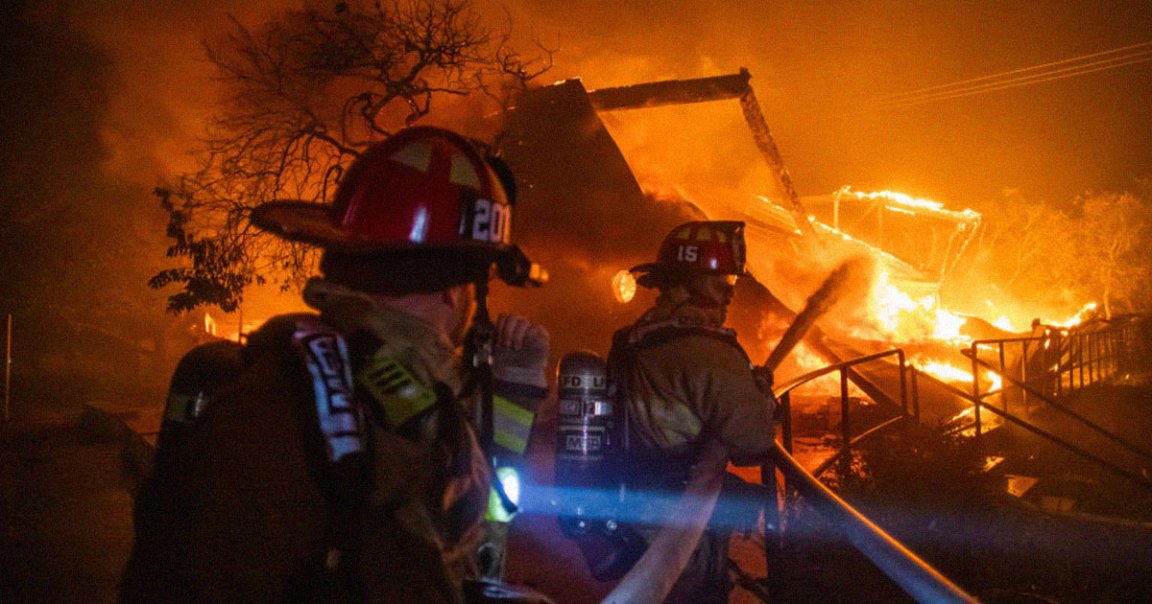
The city of Los Angeles is still battling three fierce wildfires. As of Monday morning, at least 24 people have lost their lives and more than 120,000 structures have been either damaged or destroyed in the area.
It’s a devastating situation — and the required water to keep the flames at bay is as difficult as ever to come by. The West Coast has been battling severe droughts, with Southern California getting extremely little rain last year.
While the fires raged, hydrants ran dry last week, leaving some firefighters empty-handed in the city’s greatest moment of need.
Meanwhile, as Politico reports, politicians have started pointing fingers at the burgeoning AI industry, which has garnered a reputation for sucking up staggering amounts of water to cool down the quickly-growing number of data centers powering it.
As such, three California lawmakers introduced bills last week aimed at encouraging AI data processing centers to work toward sustainable water use standards, and holding them accountable to new transparency rules.
“This is not a new issue, and it’s not one that’s been created because of the fire,” California senator Steve Padilla, who presented one of the bills, told Politico. “It’s one that is exacerbated by it, and I am concerned.”
One of the bills Padilla introduced would grant tax exemptions to data centers that adopt water recycling systems. A separate bill would require AI tools to meet water efficiency standards in the state.
“Water’s a limited resource,” assembly member Diane Papan told Politico. “I’m trying to make it so we are prepared and ahead of the curve as we pursue new technology.”
Researchers have shown that the water use of major tech companies including OpenAI, Google, and Microsoft, has skyrocketed over the last two years thanks to the tremendous number of new AI data centers.
Case in point, Microsoft’s water use shot up from 6.4 million cubic meters in 2022 to 7.8 in 2023, in large part due to the “construction of more data centers.”
Critics have long pointed out that as climate change continues to fuel extreme weather and prolonged droughts, AI tools could make the situation even worse — especially as its luminaries call for trillions of dollars in further investment.
Whether nudging AI companies toward new sustainability goals will be enough to free up some much-needed freshwater in moments of crisis remains to be seen.
But the AI industry is betting big on the future of the tech and data centers are bound to grow to power increasingly resources-intensive models.
And that means water demand is likely to keep shooting up as well. Researchers at the University of California, Riverside have predicted that AI’s global water demand could eclipse that of some European nations as soon as 2027.
How big of a role the AI industry has played in the ongoing fires in LA specifically remains unclear. Inadequate infrastructure and major budget constraints were to blame as well (and not diversity, equity, and inclusion programs, as billionaire Elon Musk suggested last week).
Nonetheless, as climate change continues to increase the likelihood of extreme weather events, it’s wise to draw attention to the issue now.
The truth is that many of the AI tools sucking up astronomical amounts of water offer not much more than a small convenience in modern society.
“It’s a recipe for disaster,” Iowa Citizens for Community Improvement organizer Jake Grobe told Futurism in 2023 after news emerged that the company’s data centers in De Moines taxed an already extremely stressed water system. “ChatGPT is not a necessity for human life, and yet we are literally taking water to feed a computer.”
More on the fires: Elon Musk Blames LA Wildfires on Black Firefighters